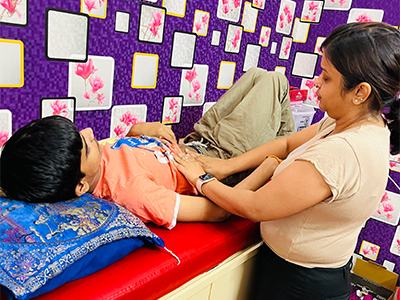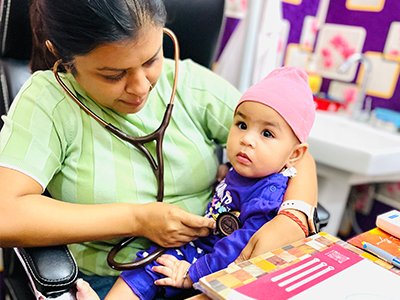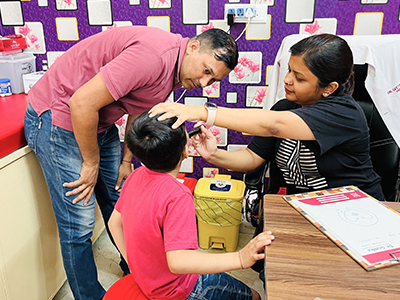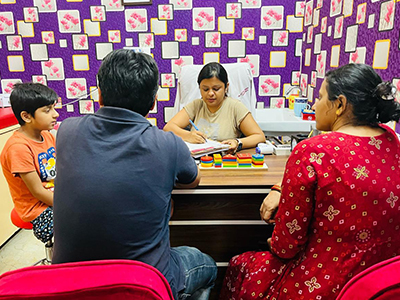
Specialized newborn care plays a crucial role in ensuring the health and well-being of infants who require extra medical attention after birth. This type of care is typically provided
in Neonatal Intensive Care Units (NICUs) or Special Newborn Care Units (SNCUs), where a team of trained doctors, nurses, and support staff closely monitor and treat newborns with conditions such as premature birth, low birth weight, infections, or breathing difficulties. Advanced medical equipment and personalized care plans help stabilize these fragile infants, giving them the best chance at a healthy start in life. Specialized newborn care not only focuses on immediate medical needs but also supports families through counseling and guidance, ensuring parents feel involved and informed throughout their baby's recovery journey
Growth and development screening of children is a vital process that helps track a child's physical, cognitive, social, and emotional milestones to ensure they are growing and
developing as expected. Regular screenings, often conducted by healthcare professionals, involve measuring height, weight, and head circumference, as well as assessing motor skills, language abilities, and social interactions. Early identification of any delays or concerns allows for timely interventions, which can significantly improve outcomes. These screenings also empower parents with knowledge and support, helping them understand their child’s progress and providing guidance on fostering healthy development. Consistent monitoring plays a key role in ensuring every child gets the best start in life.


Vaccinations are essential for protecting children from serious diseases and ensuring their long-term health.
Routine immunizations follow a set schedule, starting from birth, to safeguard against illnesses like measles, polio, and whooping cough. These vaccines help strengthen a child’s immune system, preventing the spread of contagious diseases and contributing to community immunity. When traveling, children may need additional vaccines depending on the destination, such as protection against yellow fever, typhoid, or hepatitis. Consulting a healthcare provider well in advance of travel ensures children receive the necessary shots, keeping them safe during their journey and beyond. Staying up to date with both routine and travel vaccinations is a crucial step in promoting lifelong health and preventing outbreaks.
Chronic disease management in children, such as asthma, seizures, liver and kidney diseases, and thyroid disorders,
requires a comprehensive and personalized approach to ensure long-term health and well-being. Regular monitoring, early diagnosis, and consistent treatment play crucial roles in managing these conditions effectively. For instance, asthma management focuses on controlling triggers and using medications to prevent flare-ups, while seizure management involves antiepileptic drugs and lifestyle adjustments to reduce episodes. Liver and kidney diseases often require dietary changes, medication, and sometimes specialized treatments like dialysis or transplants. Thyroid disorders, whether hypo- or hyperthyroidism, are managed with hormone therapy and regular blood tests to maintain balance. A collaborative effort between healthcare providers, families, and caregivers is essential to ensure children receive timely care, maintain a good quality of life, and prevent complications


Mental health and behavioral disorders in children are increasingly recognized as crucial aspects of overall well-being,
requiring early identification and appropriate support. Conditions such as anxiety, depression, attention-deficit/hyperactivity disorder (ADHD), and autism spectrum disorder (ASD) can significantly impact a child’s emotional, social, and academic development if left unaddressed. Effective management involves a combination of psychological counseling, behavioral therapies, family support, and, in some cases, medication. Creating a nurturing environment at home and school plays a key role in promoting positive mental health. Regular screenings, open communication, and reducing stigma around mental health help ensure children receive the care and understanding they need, empowering them to thrive and reach their full potential.
Proper nutrition is essential for a child’s growth and development, and its impact is closely linked to the evaluation
of short stature. Short stature, defined as a height significantly below the average for a child’s age and gender, can be influenced by factors such as genetics, chronic illnesses, hormonal imbalances, and inadequate nutrition. Evaluating short stature involves a thorough assessment of the child’s medical history, dietary habits, growth patterns, and sometimes specialized tests to identify underlying causes. Nutritional deficiencies, especially in proteins, vitamins, and minerals like zinc and iron, can hinder growth. Addressing these gaps through a well-balanced diet, supplementation when necessary, and ongoing monitoring helps support healthy growth. Early detection and intervention are key to improving outcomes and ensuring children reach their full growth potential.


Adolescent health issues are diverse and complex, reflecting the physical, emotional, and social changes that occur
during this critical stage of development. Common concerns include mental health challenges like anxiety, depression, and stress, often triggered by academic pressure, social expectations, and identity exploration. Physical health issues such as hormonal changes, menstrual irregularities, acne, and nutritional deficiencies are also prevalent. Risky behaviors, including substance abuse, unsafe sexual practices, and unhealthy lifestyle choices, can further impact well-being. Access to accurate health information, supportive family environments, and adolescent-friendly healthcare services play a crucial role in addressing these concerns. Promoting healthy habits, open communication, and early intervention empowers adolescents to navigate this phase confidently, laying the foundation for a healthy adulthood.
Parental counseling for genetic disorders is a crucial support system that helps families understand the nature,
mplications, and management of inherited conditions. It provides parents with essential information about the genetic basis of the disorder, the likelihood of transmission, and potential health outcomes for their child. Counseling sessions offer emotional support, helping parents cope with the uncertainty and emotional stress associated with a diagnosis. Additionally, counselors guide families through medical decisions, treatment options, and long-term care planning while addressing any psychological and social challenges they may face. Empowering parents with knowledge and resources enables them to make informed decisions, advocate for their child’s needs, and build resilience in navigating the complexities of genetic conditions

Gravida tincidunt fugit explicabo metus incididunt, ducimus ultrices, repudiandae urna illo rem reiciendis excepteur, occaecati facilis modi.
Copyright © 2025 Child Care. Powered By drgeetikaschildcare.